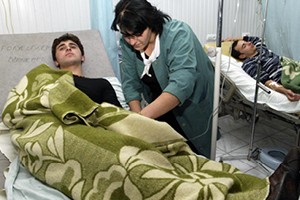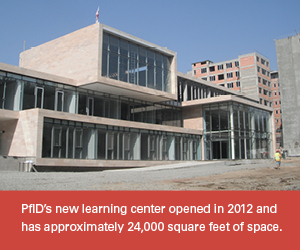Transforming medicine in another Georgia
By Dana Goldman

Ken Walker enlisted anyone he could to help with the effort. Countless Emory faculty and students found themselves conducting workshops on health care policy and administration, analyzing health outcomes, and helping Georgians lobby for health care reform. Photographer Uriel Sinai/Getty Images
Six thousand miles away from Emory, internist Ken Walker 56Ox 58C 63M was in the "other" Georgia—the former Soviet territory—when the bombing started in August 2008. Tensions with another region had escalated, and Georgia had begun exchanging fire with the breakaway region of South Ossetia and Russia. Staying in Tbilisi, Georgia's capital city, Walker watched as hundreds of casualties streamed into Central Republican Hospital.
Walker, deputy chief of medicine at Grady Hospital, would learn that the hard work of Emory physician faculty in Georgia had paid off. Only months before, 17 of Georgia's doctors had completed a mini-residency program in emergency medicine under the tutelage of Emory faculty. Until the group's graduation, the specialty of emergency medicine had been nonexistent in Georgia, a country of more than 4 million people. By the end of the Russo-Georgian conflict a few weeks later, the newly anointed emergency medicine doctors cared for hundreds of casualties with only a few deaths.
|
|
Georgia's new specialty of emergency medicine proved its usefulness. And Walker's project, which he named Partners for International Development (PfID), gained more momentum in its quest to transform health care in a developing country nine time zones away.
'Where's Tbilisi?'
The story of how Emory came to have a presence in Georgia goes back more than 20 years. It was 1992, less than a year after the fall of the Soviet Union, when a former Emory medical dean made a late-afternoon phone call to Walker.
"Do you want to go to Tbilisi?" the dean asked Walker with little preamble.
"Sure," Walker said. "Where's Tbilisi?"
The newly independent Georgia and its capital city, Tbilisi, were struggling economically amid social unrest. Despite a glut of doctors, health care was deteriorating, with basic supplies like thermometers available only sporadically. Nurses with only a high school level of education worked more like assistants than professionals in their own right.
Concerned that the health care of millions would spiral downward, the U.S. State Department created a program to match American hospitals and medical schools with their counterparts in the former Soviet Union.
Soon Walker and other Emory doctors from Grady Hospital and from Morehouse School of Medicine were flying to Georgia.
"Our charge was to identify one particular hospital and help it. We visited individual hospitals and medical schools. They had about 27 institutes—the institute of surgery, of trauma, of internal medicine," Walker says.
At the end of the trip, Walker made a decision: "I decided that the partnership needed to be with the country rather than with an individual hospital."
Over the next decade, Walker enlisted anyone he could to help with the effort. Countless Emory faculty and students from throughout health sciences found themselves conducting workshops on health care policy and administration, analyzing health outcomes, and helping Georgians lobby for health care reform. When faculty members saw that Georgian medical libraries were stocked with outdated resource guides in Russian, they developed a multimedia library equipped with computers and high-speed internet and a generator to ensure usability during daily electricity outages.
During the academic year, Georgian students received training in Emory's schools of medicine, nursing, and public health. In the summers, Emory medical, nursing, and public health students traveled to Georgia to conduct research studies. One Emory student analyzed the placenta blood of Georgia newborns and discovered significant thyroid deficiencies in more than 60% of the babies. The problem hadn't existed in Soviet times, and Emory doctors soon discovered why.
"It turned out that in the Soviet Union there was a salt factory that produced iodized salt," says Walker. "When the Soviet Union imploded, the factory rusted and stopped." Iodized salt stimulates thyroid functioning. Once the problem was discovered, Emory worked with Georgian public health officials to find a new supply.
Teaching the teacher
For the past four years, Emory and PfID have held a mini-residency program in emergency medicine for doctors and training programs for practicing nurses with funding from the U.S. Agency for International Development, George Soros's Open Society Foundations, the B. Wardlaw foundation, and others. Doctors and nurses train at a learning center in Tbilisi established by PfID in 2009 that is furnished with modern medical simulation equipment and now employs 30 Georgians. So far, 17 emergency medicine physicians and thousands of nurses have been trained by PfID.
 Photographer Vano Shlamov/Getty Images Photographer Vano Shlamov/Getty Images
|
|
The train-the-trainer philosophy is central to PfID's plan. "The approach that Emory has taken in Georgia has been heavily oriented on education," says Archil Undilashvili, a native Georgian who serves as PfID's director of programs and director of research programs in Emory's Department of Medicine. "Starting with full-time involvement, we gradually shift down and put our local colleagues in charge, although we keep in systematic contact with them. Because what we saw is that we can make much longer-term changes if we base our work on education rather than just doing point-and-shoot temporary work."
Walker adds, "The principle that's been so important to us is to educate the people of Georgia so that from then on they could educate their own people, and education by itself will open whole new professional opportunities."
The emergency medicine residency is popular with doctors, who recognize the specialty as a way to get a leg up in a country with an abundance of physicians. Says Ketevan Stvilia, the Georgian point person for PfID, "They are very happy because they are able to practice something different. Demand for them is very high. Now large hospitals are opening emergency departments, and they are the heads of these departments."
Over the past year or so, no fewer than 75 new small hospitals have been built around the country. "All of them have emergency departments, but they don't have the personnel to practice emergency medicine," says Stvilia. For that reason, a large health insurance company in Georgia recently contracted with PfID to provide the residency program to its doctors in rural areas around the country.
New curricula
|
|
|
PfID is currently piloting a new curriculum at Tbilisi State Medical University, following Emory's lead on a number of fronts: exposing medical students to clinical work early on, emphasizing the importance of communication skills, and exploring the role of the doctor-patient relationship, says project leader Gordon Churchward, the medical school's assistant dean for medical education. Each lesson interweaves themes familiar to students at Emory, such as leadership, scholarship, and societal responsibility.
Emory oncologist Mary Jo Lechowicz was part of a group that flew to Georgia this past fall. For seven days she met with faculty and students to support curriculum development for the country's medical schools. There, Lechowicz came to appreciate some of the challenges that come with a cross-cultural collaboration. "One of the students asked us, 'How many times a day do you lie?' because in their culture the patient doesn't always know the diagnosis," she says. "It's a totally different way of processing the doctor-patient relationship."
PfID, along with Emory's Nell Hodgson Woodruff School of Nursing, started the country's first-ever continuing education program for nurses in 2009. Until then, nurses were given little respect or responsibility. Walker explains, "Nurses were trained after the ninth or 10th grade of high school. There was not very much of a clinical component to their education," he says. As such, this left doctors to do what's typically considered the job of nurses in most developed countries.
PfID trained eight local nurses and eight local physicians to serve as local nursing faculty, collaborating to create intensive curricula to enhance nursing skills and knowledge. "We have about 50% didactic work, and then the rest is split between simulations and clinical sessions," reports Undilashvili. "We've worked with Georgian nurses on simple hand-washing practices, taking care of bedsores, how to clean the patient and equipment, and how to be a nursing leader and create a successful nursing service and structure."
Since 2009, more than 3,200 nurses around the country have taken the intensive training, including Georgia's first lady, Sandra Roelofs. "All the health care providers now are asking nurses to take our courses," says Stvilia. "They do not hire a new nurse if she does not have our certificate. There's a huge demand in regions with new hospitals."
Georgians helping Georgians
Georgians have taken notice of Emory's role in improving their country's development. Through the partnership, more Georgians have come to Emory for degrees than to any other university in the United States. Some, including Undilashvili, have joined Emory's faculty and staff.
And so when Georgians decided a few years ago to create a national training center for health care workers, they modeled it after PfID's own new learning center and asked the nonprofit to establish courses and curriculum. "Emory's name is very big here," says Stvilia. "That's why they decided to have Emory in charge of this new national training center because of the good reputation and confidence that Emory can do it." Georgia wants all its physicians, about 21,000 in all, to take part in training there; a new contract between the Georgia government and Emory was signed in September. If PfID continues on its path, the two Georgias will have more in common in terms of health care and health outcomes. EM
Related Links
"Emory physicians will conduct simulation training in Republic of Georgia"







